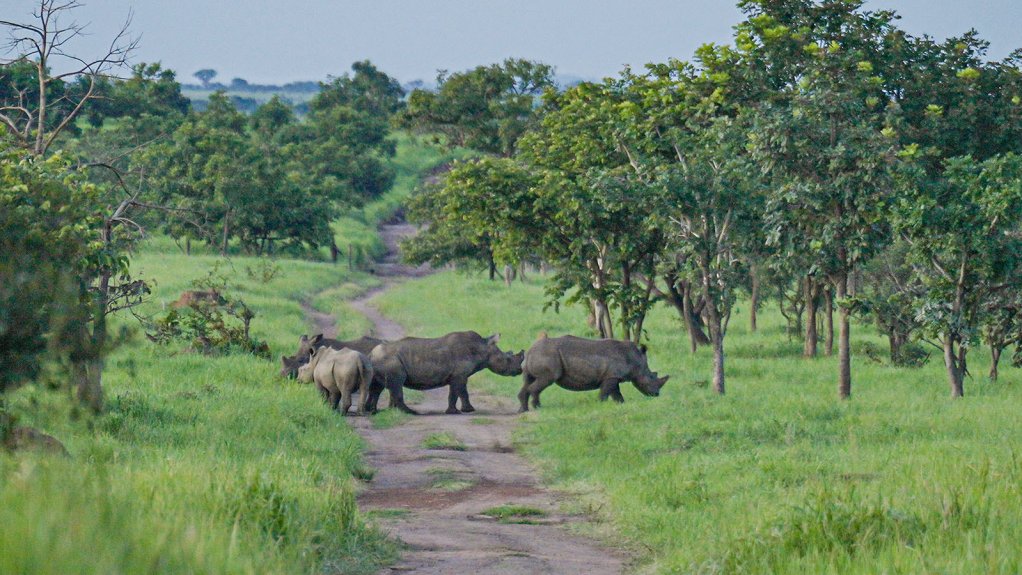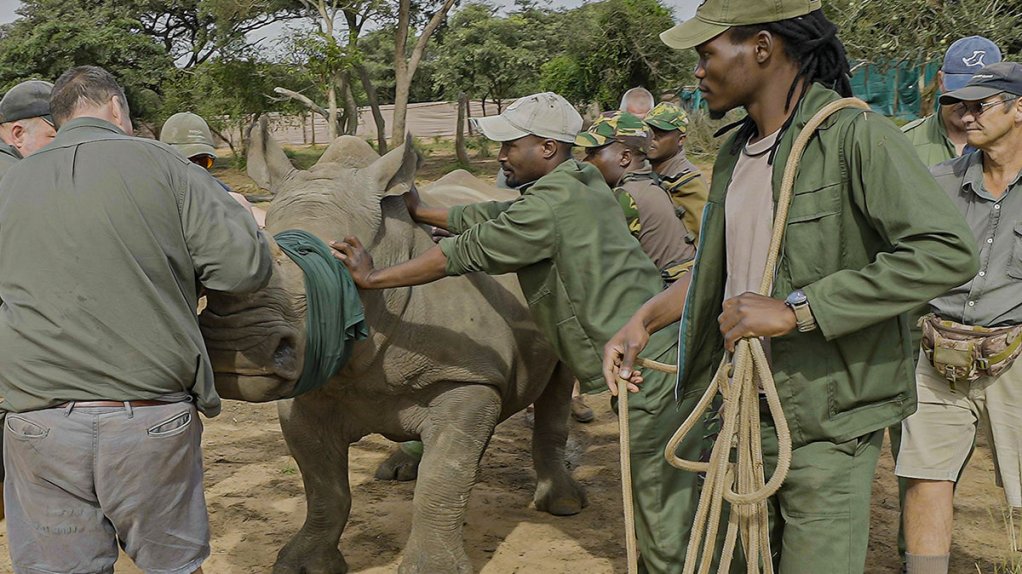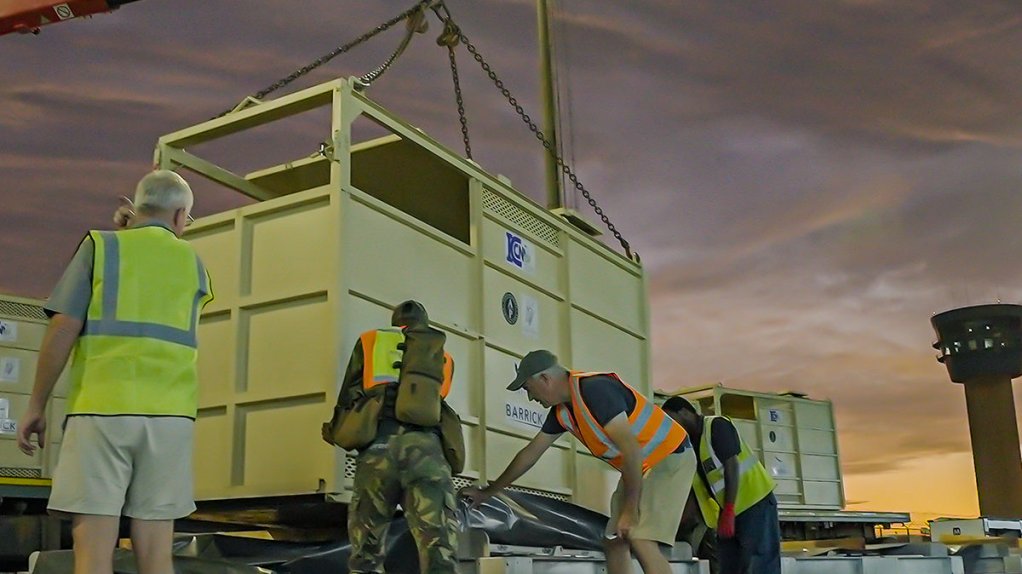
16 white rhinos have been successfully reintroduced to the Garamba National Park in the northeast of the DRC.

The rhinos were sourced from the &Beyond Phinda Private Game Reserve in Kwazulu
Natal, South Africa
Their translocation was achieved in collaboration with the Institut Congolais pour la Conservation de la Nature, the Congolese government and African Parks.
13th June 2023
By: Creamer Media Reporter

An initiative begun by Barrick president and CE Mark Bristow almost 13 years ago has come to fruition with the successful reintroduction of 16 white rhinos to the Garamba National Park in the northeast of the Democratic Republic of Congo, where the species was last seen in 2006.
Following more than a decade of dedicated action and support, an environment has been created where they can exist safely. The rhino arrived by aircraft from South Africa last week and have now been released in the park where professional staff and qualified veterinarians will regularly monitor their acclimatisation.

NYSE- and TSX-listed Barrick Gold was the lead donor in the translocation as part of its long-standing partnership with African Parks and Garamba National Park, Africa’s oldest wildlife park and a Unesco World Heritage Site. To date, Barrick has provided more than $2.5-million for tracking collars, fuel for observation planes, rescue and rehabilitation programmes, as well as improvements to critical infrastructure such as roads and bridges.
The rhinos were sourced from the &Beyond Phinda Private Game Reserve in KwaZulu-Natal, South Africa, and their translocation was achieved in collaboration with the Institut Congolais pour la Conservation de la Nature, the Congolese government and African Parks.

Garamba was one of the last strongholds of the now extinct wild northern white rhino. The introduction of the near-threatened southern sub-species not only promotes the long-term conservation of rhino in Africa by extending their range, but also creates another breeding node for the species in a safe environment.
Since African Parks assumed management of Garamba in 2005, there has been a significant decrease in poaching and most wildlife species found there are showing positive population increases, thanks largely to the development of alternative socio-economic initiatives in and around the park. Additionally, rhino have historically played an important role in regulating the structure and functioning of the park’s ecosystem, creating and maintaining grazing lawns that support other fauna and flora and provide important ecosystem services.
Bristow says Barrick’s continued support for Garamba is based on the company’s holistic approach to sustainability.
“Conserving biodiversity is fundamental to planetary survival, essential to tackling climate change and has an important role to play in the war on poverty. We strive not only to preserve and maintain biodiversity within our permits but to partner with NGOs and other organizations, such as African Parks and Garamba, to protect and restore critical biodiversity in some of the world’s most precious places,” he says.
Barrick’s successful group-wide biodiversity strategy places importance on protecting areas with high conservation value.
It is very important to understand the relationship between the natural environment and the communities that depend on it. Garamba is one of the biggest employers in the region, with over 500 full-time staff and hundreds more employees on contract, including law enforcement teams and dedicated community personnel. The park also supports more than 9 000 community members in entrepreneurial enterprises including beekeeping, fish and poultry farming as well as four hospitals with a capacity of 12 000 patients.
Edited by Creamer Media Reporter

Their translocation was achieved in collaboration with the Institut Congolais pour la Conservation de la Nature, the Congolese government and African Parks.
13th June 2023
By: Creamer Media Reporter

An initiative begun by Barrick president and CE Mark Bristow almost 13 years ago has come to fruition with the successful reintroduction of 16 white rhinos to the Garamba National Park in the northeast of the Democratic Republic of Congo, where the species was last seen in 2006.
Following more than a decade of dedicated action and support, an environment has been created where they can exist safely. The rhino arrived by aircraft from South Africa last week and have now been released in the park where professional staff and qualified veterinarians will regularly monitor their acclimatisation.
NYSE- and TSX-listed Barrick Gold was the lead donor in the translocation as part of its long-standing partnership with African Parks and Garamba National Park, Africa’s oldest wildlife park and a Unesco World Heritage Site. To date, Barrick has provided more than $2.5-million for tracking collars, fuel for observation planes, rescue and rehabilitation programmes, as well as improvements to critical infrastructure such as roads and bridges.
The rhinos were sourced from the &Beyond Phinda Private Game Reserve in KwaZulu-Natal, South Africa, and their translocation was achieved in collaboration with the Institut Congolais pour la Conservation de la Nature, the Congolese government and African Parks.
Garamba was one of the last strongholds of the now extinct wild northern white rhino. The introduction of the near-threatened southern sub-species not only promotes the long-term conservation of rhino in Africa by extending their range, but also creates another breeding node for the species in a safe environment.
Since African Parks assumed management of Garamba in 2005, there has been a significant decrease in poaching and most wildlife species found there are showing positive population increases, thanks largely to the development of alternative socio-economic initiatives in and around the park. Additionally, rhino have historically played an important role in regulating the structure and functioning of the park’s ecosystem, creating and maintaining grazing lawns that support other fauna and flora and provide important ecosystem services.
Bristow says Barrick’s continued support for Garamba is based on the company’s holistic approach to sustainability.
“Conserving biodiversity is fundamental to planetary survival, essential to tackling climate change and has an important role to play in the war on poverty. We strive not only to preserve and maintain biodiversity within our permits but to partner with NGOs and other organizations, such as African Parks and Garamba, to protect and restore critical biodiversity in some of the world’s most precious places,” he says.
Barrick’s successful group-wide biodiversity strategy places importance on protecting areas with high conservation value.
It is very important to understand the relationship between the natural environment and the communities that depend on it. Garamba is one of the biggest employers in the region, with over 500 full-time staff and hundreds more employees on contract, including law enforcement teams and dedicated community personnel. The park also supports more than 9 000 community members in entrepreneurial enterprises including beekeeping, fish and poultry farming as well as four hospitals with a capacity of 12 000 patients.
Edited by Creamer Media Reporter
No comments:
Post a Comment